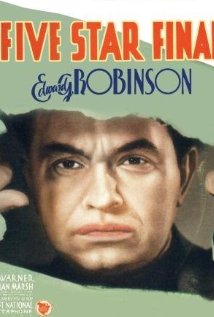
FIVE STAR FINAL
US, 1931, 89 minutes, Black and white.
Edward G. Robinson, Marion Marsh, H.B. Warner, Frances Starr, Anthony Bushell, Boris Karloff, Aline Mac Mahon, Oscar Apfel.
Directed by Mervyn Le Roy.
Five Star Final is well worth seeing so many decades after its release. Despite its his being strongly rooted in the early 1930s, its message and its portrait of tabloid journalism is still particularly relevant. It was amongst the nominees for Best Picture Oscar for 1931.
The film was made by First National, later incorporated into Warner Brothers and it has the Warner Brothers look and feel about it, especially with Edward G. Robinson effective, as always, as the editor of the sleazy tabloid, The Gazette. The direction is by Mervyn Le Roy who had already directed Robinson in Little Caesar. Le Roy was to have a strong career in tough films in 1930s moving to bigger budget romantic dramas at MGM in the 1940s.
There is a very interesting list of performers and the supporting cast, including Boris Karloff, at the time of Frankenstein, as an extremely disreputable tabloid reporter. This was the first film for Aline Mac Mahon, as Robinson’s secretary, critical of him, yet in love with him. H.B. Warner, who had been Jesus in Cecil B. de Mille’s King of Kings (1927) has a good role as a banker protecting his wife who had committed a murder in her past, had been released from prison, Frances Starr, and, on the eve of the wedding of her daughter, Marian Marsh to British actor, Anthony Bushell, is faced with exposure in the tabloids. Marian Marsh has a powerful scene at the end when she confronts the editors continually asking, “why did you kill my mother?”.
This was the period of the first version of The Front Page and these newspaper films set the tone for hard-hitting newspaper dramas and comedies, with rapid-fired dialogue, and with social criticism.
1. The impact of the film? For an early 1930s audience? Its relevance to tabloid journalism of the time? In succeeding generations? In the 21st century? The influence of the film on other newspaper dramas and comedies?
2. Black-and-white photography, the city, the newspaper offices, society, wedding preparations, the church? The musical score?
3. The title, the final edition, the stop-press, the addition of sensational stories? And the irony of the paper in the gutter at the end and its being swept away with the rubbish?
4. The picture of the newspaper, the girls and the phone exchange, especially the girl with the drawl? The proprietors, the discussions, the importance of circulation, comparisons with other papers, the goal of making money and selling papers? The lack of interest in principles, commentary? News, sensational stories? The planned story of the woman who committed the murder 20 years earlier? Serialised? The comment on the public and their taste? The importance of circulation – and the attack on the kiosk which had put The Gazette under others?
5. Edward G. Robinson as Randall, 10 years on the job, the rapid fire dialogue, the phone calls, articles, sensation, stop-press, design, layout and photos? His relationship with Miss Taylor, her devotion to him? Going to drinks at Corcoran’s? His relationship with the owner, circulation manager? The plan for the series? Sending out Isopod to get stories? His success, the photo, the planned exploitation of the story? The woman journalist, her being hired on her looks, her getting into the apartment, discovering the bodies, the photographer? Phoning in the information for it to be used? The effect on Randall?
6. Miss Taylor, devotion, ironic cracks, her drinking, the phone calls?
7. The Townsends, Michael, his work in the bank, his devotion to Nancy, love and affection, bringing up Jenny? The preparation for the marriage? The concealing of Nancy’s identity, their thinking that Isopod was a minister, giving him the information, asking his help, the realisation that they had been tricked? Nancy, the phone calls (and the triple split screen with her in the centre, the recipients of the calls at either side)? Her desperate pleading? The arrival of Mr and Mrs Weeks, the stern stance, Mrs Weeks unrelenting? Nancy and her desperation, killing herself? Michael, his going to see the Reverend at the church, coming home, finding his wife, Jenny and Phillip arriving, his covering, the pretend phone call, his killing himself?
8. Jenny, young, enthusiastic, with Philip, in love, his background? The newspaper story, discovering the truth, her grief, his parents arriving, his mother laying down the law, his defying her and saying she was hard-hearted? Jenny and her going to the office, the confrontation with editor and publisher, “why did you kill my mother”? The gun, Phillip arriving, taking the gun, threatening them?
9. Isopod, Boris Karloff, sleazy look, way of speaking, drinking, eager to investigate and write articles, pretending to be the clergyman, unctuous with Nancy and Michael, listening, getting all the information, the photo, not knowing details, coming back to the office, the story? His later plans, paying Journey for her mother’s story? His presence during her outburst? His perspiring and his reaction?
10. The role of journalists, tabloid, scandals, the woman and her intrusion into the apartment, the filming of the suicides?
11. Other members of the staff, the young man and his chat with Miss Taylor? Ziggie, his lounging attitude, his plans for promotion, the competitions, with the taxis, with the bathing girls, contacts with the police, the threats to the kiosks who didn’t promote The Gazette?
12. A film of its time, but perennial themes even in an age of social media?